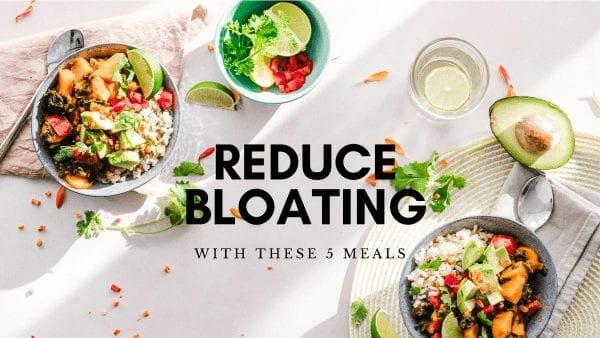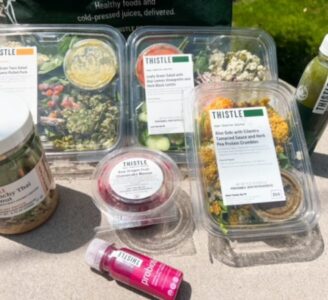This Reduce Bloating post contains affiliate links and we may be compensated if you make a purchase. All opinions are our own.
Written By Alison Chew | Dietitian Verified by Rebecca Housh, MS, RDN

We’ve all experienced that uncomfortable swollen feeling after eating a big, greasy meal. Ugh, it’s the worst! But what exactly causes bloating, and what can you do to stop it from happening again?
Luckily, there are some easy steps you can take to prevent the stomach fullness and tightness associated with bloating.
Here, we’re diving into the most common culprits of bloating and sharing five tasty meals that will help prevent GI discomfort.
What’s really behind your puffiness? It’s not just chowing down on fried foods that cause bloating. Here are five common causes of bloating that might surprise you.
In addition to sipping lots of water and exercising every day, eating the right foods can help get rid of bloat. Here, we’ve rounded up five meals that can easily be incorporated into your diet to reduce bloating.
(Pro tip: Start adding more fiber to your diet slowly to give your body time to adjust. Too much fiber can cause bloating too!)

Adding more water and fiber-rich fruit to your diet is a great way to fight bloating. Some of the best bloat-minimizing ingredients to add to a smoothie include yogurt (packed with gut-friendly probiotics), pineapple (high water content), ginger (aids in digestion), and if you’re into savory smoothies, parsley (a diuretic).
These Smoothie Delivery Services can help!

Give your mornings a makeover by noshing on oatmeal. This easy-to-prepare breakfast staple is packed with insoluble fiber, which will keep you full longer, ensure your bowels are working the way they should, and nip bloating in the bud. Top with walnuts or fruit for extra bloat-reducing fiber.
Check out the following Meal Services that deliver Oatmeal to your door!

Salads don’t have to be sad. Made with the right base and the right toppings, they can keep bloating at bay. Spinach is an ideal salad base; it has a mild flavor and is loaded with fiber. As for toppings, some of the best bloat-beaters include fennel, avocado, cucumber, beet, and tomato.
Just be careful with cruciferous veggies like broccoli, Brussels sprouts, and cauliflower. They tend to cause more gas, which can lead to bloat. Get Salads and more delivered to your door with the following Meal Services!

Grain bowls are having a moment these days and for good reason. They’re not only easy to prepare, but they’re also seriously good at curbing bloat, if you include the right ingredients. If you’re sensitive to gluten, quinoa makes a great base for your grain bowl. Lentils are also a solid choice for a base, but you’ll want to limit your bean intake since their high-fiber content can cause gas and bloat.
Add bloat-minimizing toppings like avocado, tomato, asparagus, and yogurt-based dressing to your grain bowl for a nutritious and tasty meal.

Eating soup is a great way to up your hydration game and get more fiber into your body, both of which can reduce bloating. That said, most processed soups are loaded with sodium. Instead, make soup from scratch to ensure you’re getting all of the fiber and nutrients from your ingredients.
Load up your soup with your favorite vegetables (remember: avoid ones that can cause bloating) and enjoy!
Note from our Dietitian: If you continue to experience bloating consult your doctor because it could be a sign of a larger issue.
Interested in having these meals delivered directly to your door? We can help! MealFinds is the first and only meal service comparison site that allows you to search over 550+ meal services to find the one right for you.
| This post has been reviewed and approved by our dietitian Rebecca Housh, MS, RDN, LDN for nutritional accuracy. | |
|---|---|
 | Rebecca Housh is a registered dietitian based in Chicago, IL. She earned a Bachelor of Science in Human Physiology from Boston University and a Master of Science in Human Nutrition from the University of Illinois in Chicago. Rebecca is passionate about the idea of food as medicine in both preventative and therapeutic care. Her current professional interests lie in food security, food access, and nutrition for chronic disease. |


